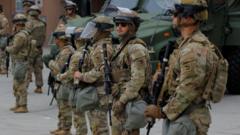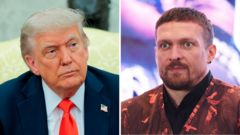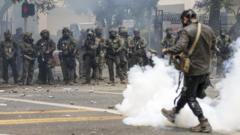In an escalating scenario, President Donald Trump has responded swiftly to protests in Los Angeles, leveraging the situation to push his law-and-order agenda and assert federal control.
Trump's Mobilization of the National Guard: A Calculated Move in the LA Protests

Trump's Mobilization of the National Guard: A Calculated Move in the LA Protests
As protests ramp up in California, Trump's administration seizes the moment to assert federal power and rally support.
In recent days, Los Angeles has witnessed a series of protests against the actions of Immigration and Customs Enforcement (ICE), coinciding with President Trump's strong stance against what he perceives as left-wing lawlessness on American streets. On the campaign trail, Trump had vowed that should such situations arise, he would not hesitate to exercise his presidential powers. This past weekend's protests provided him a clear opportunity for action, despite local officials, including the LAPD, maintaining that the majority of the gatherings in the city were peaceful.
Reports from the Trump administration alleged that immigration agents faced hostility and were being targeted. Given the LAPD's response time, Secretary of Homeland Security Kirsty Noem expressed disapproval of local law enforcement's approach during an interview, stating their lack of immediate support during violent protests was unacceptable.
In light of this, Trump federalized 2,000 California National Guard troops, despite California Governor Gavin Newsom's objections. The rapid mobilization of forces was complemented by Defense Secretary Pete Hegseth's indication that Marines were on "high alert" for possible deployment, which would signify a notable utilization of active military power domestically.
By the time the sun rose on Sunday, Trump declared success and praised the National Guard's role in restoring calm, although they had not yet fully assembled on the ground. The urgency of Trump's response reveals an administration ready and willing to engage in confrontations that resonate with his strong base while also appealing to independent voters concerned about safety.
Contrast this with the criticisms from Democratic leaders, including New Jersey Senator Cory Booker, who argue that the administration's aggressive use of armed immigration officers risks inciting further unrest. They assert that Trump's interference escalates tensions rather than alleviating them, disrupting a long-standing tradition of managing protests without military intervention.
As summer unfolds, with its historical backdrop of civil demonstrations, the protests in Los Angeles may serve as a pivotal moment. They could either remain an isolated incident or signify a larger pattern as Americans continue to voice their grievances in the months ahead.
Trump's actions suggest a continuation of a politically charged climate where the intersection of immigration policy and civil unrest could become a focal point leading into the next election cycle.

















